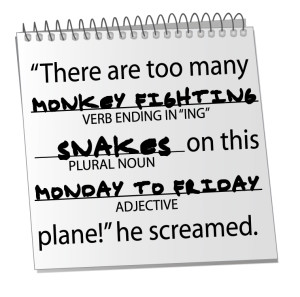
CC image courtesy of Aaron & Alli on Flickr. Some rights reserved.
I have a confession to make.
When I first started on Twitter, I kind of overdid it with the retweeting. I searched for output on writing and inspirational quotes, and fell into a perfect vortex of quotables (how’s this for a QWERTY slip: on my first pass at the foregoing sentence, I typed “vortext” — a vortex of text, yar!).
I have another confession: as a child, I was a Mad Libs junkie. Yes, that Mad Libs. The game of ignorant word substitution, where one person knows the story and the other one supplies words to fill in the blanks. My friend T and I would play for hours, laughing ever more insanely as time went by. We quoted each other our literary outputs for weeks afterwards.
Now I have a mad plan to bring these two dormant fascinations together. But I want help. Will you be my enablers?
Quotations are cool, but they have their limits
As I said, I love quotes.
I’m talking about all kinds of quoted language: brainy quotes from magazine articles, insightful quotes from speeches, inspirational quotes from Zen books and Hallmark cards, cool language displayed in literature or by the literati, snarky quotes from pop culture, TV and movies, quotes about writing, quotes about seizing the moment, quotes about puns and wordplay, quotes about the metaphoric uses of coffee.
Written quotes. Spoken quotes. Scripted quotes and improvised quotes, quotes set to music and quotes a capella.
Before I knew it, most of my time on Twitter was spent obsessively chasing down, favoriting, and retweeting quotes of every description. I feasted on quotes the way other people feast on candy or chocolate or coffee or beer.
Somehow, I got a hold of myself. I pulled myself out of the narcotic haze of brilliant language written by other people, and I asked myself the hard question. Was anyone interested in listening to me quote?
Hm.
Why was I retweeting the posts of other users which were themselves quotations by some third or fourth party — What was even remotely useful about this behavior?
We laugh better together
Mad Libs is not a game for the solitary. Its genius lies in the knowing collaboration between two people where one has information and the other knows their words will be twisted out of all proportion.
I had a stack of Mad Libs books. T and I re-used them so often, the pages where we filled in the words were divided into columns. Eventually we had to add looseleaf pages with additional columns. Sometimes we were innocuous: chair, clean, surprisingly, jumped. Often we went for the ridiculous, because we knew where this was all heading: toadstools, mutated, unbearably, exploded.
After the list was complete, we read the story results aloud to each other. The ensuing literature was without exception hilarious. (Really.)
Send me your quotes!
What I would like to propose is libbing on a grand scale, using the internet, and plugging into the great human propensity to hurl quotes at each other.
I am going to compose an entire story made up of unrelated quotations. And you’re going to help me. Our roles look like this:
You: send me quotations
Me: rearrange and string together.
Post it here.
What better use of quotations, digital media, and native human wackiness?
Here’s how you submit your quotes:
- Post your quotes here, in the comments
- Email [link] them using the contact form
- Tweet to me @aocwrites using #DigitalMadLibs
Quotation submission cutoff will be the end of July, 2013.
Quotation guidelines:
- Quotes will be up to 20 words in length. No longer.
- No porn!
- No drugs!
- No gratuitous foul language! I’ll accept the occasional *$#@! when used for emphasis, and I reserve the right to determine what “occasional” and “emphasis” is.
- Topics and sources may include but are not limited to: famous sayings by famous people, inspirational, literary, business, movies, TV, sports, travel, stand-up, food, zombies, and music. Still don’t have any ideas? I’m sorry.
- Be as earnest or as silly as you like. The more we have of both category, the better.
- Include the source, if you have it. Just because I’m a nerd, and I’d like to have that information.
Maybe some of you will want to make your own Mad Libs stories? I’d love to see those!
Let the quote-libbing begin!





